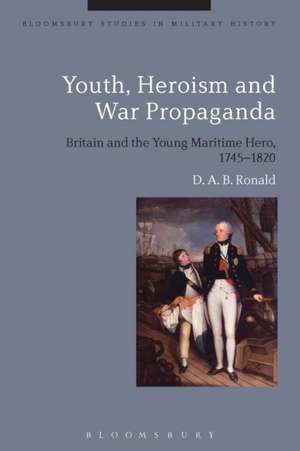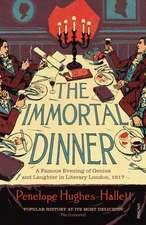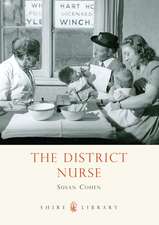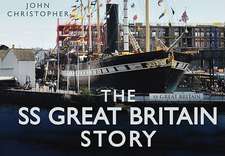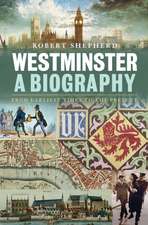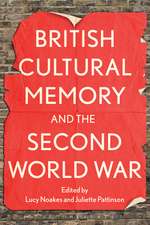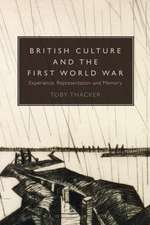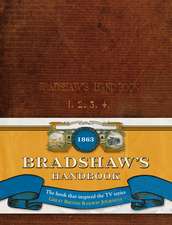Youth, Heroism and War Propaganda: Britain and the Young Maritime Hero, 1745-1820: Bloomsbury Studies in Military History
Autor D. A. B. Ronalden Limba Engleză Paperback – 24 aug 2016
| Toate formatele și edițiile | Preț | Express |
|---|---|---|
| Paperback (1) | 258.77 lei 6-8 săpt. | |
| Bloomsbury Publishing – 24 aug 2016 | 258.77 lei 6-8 săpt. | |
| Hardback (1) | 775.26 lei 6-8 săpt. | |
| Bloomsbury Publishing – 25 feb 2015 | 775.26 lei 6-8 săpt. |
Din seria Bloomsbury Studies in Military History
- 14%
 Preț: 509.59 lei
Preț: 509.59 lei - 22%
 Preț: 257.68 lei
Preț: 257.68 lei - 22%
 Preț: 258.24 lei
Preț: 258.24 lei - 22%
 Preț: 258.42 lei
Preț: 258.42 lei - 13%
 Preț: 258.42 lei
Preț: 258.42 lei - 13%
 Preț: 258.77 lei
Preț: 258.77 lei - 13%
 Preț: 259.07 lei
Preț: 259.07 lei - 13%
 Preț: 259.16 lei
Preț: 259.16 lei - 22%
 Preț: 238.76 lei
Preț: 238.76 lei - 22%
 Preț: 256.85 lei
Preț: 256.85 lei - 23%
 Preț: 190.59 lei
Preț: 190.59 lei - 22%
 Preț: 257.68 lei
Preț: 257.68 lei - 22%
 Preț: 257.59 lei
Preț: 257.59 lei - 22%
 Preț: 257.97 lei
Preț: 257.97 lei - 13%
 Preț: 238.01 lei
Preț: 238.01 lei - 22%
 Preț: 834.70 lei
Preț: 834.70 lei - 18%
 Preț: 257.59 lei
Preț: 257.59 lei - 12%
 Preț: 259.42 lei
Preț: 259.42 lei - 22%
 Preț: 261.17 lei
Preț: 261.17 lei - 13%
 Preț: 258.42 lei
Preț: 258.42 lei - 22%
 Preț: 226.60 lei
Preț: 226.60 lei - 13%
 Preț: 223.10 lei
Preț: 223.10 lei
Preț: 258.77 lei
Preț vechi: 331.86 lei
-22% Nou
Puncte Express: 388
Preț estimativ în valută:
49.52€ • 51.51$ • 40.88£
49.52€ • 51.51$ • 40.88£
Carte tipărită la comandă
Livrare economică 15-29 aprilie
Preluare comenzi: 021 569.72.76
Specificații
ISBN-13: 9781350002012
ISBN-10: 1350002011
Pagini: 304
Ilustrații: 12 bw illus
Dimensiuni: 156 x 234 x 24 mm
Greutate: 0.43 kg
Ediția:NIPPOD
Editura: Bloomsbury Publishing
Colecția Bloomsbury Academic
Seria Bloomsbury Studies in Military History
Locul publicării:London, United Kingdom
ISBN-10: 1350002011
Pagini: 304
Ilustrații: 12 bw illus
Dimensiuni: 156 x 234 x 24 mm
Greutate: 0.43 kg
Ediția:NIPPOD
Editura: Bloomsbury Publishing
Colecția Bloomsbury Academic
Seria Bloomsbury Studies in Military History
Locul publicării:London, United Kingdom
Caracteristici
An original take on propaganda history, countering the view that propaganda was a modern invention
Notă biografică
D. A. B. Ronald is an independent scholar and has a PhD from the University of Exeter, UK.
Cuprins
List of IllustrationsPrefaceNotes on Dates, Spelling, Language and TitlesList of Abbreviations 1: Introduction: Britannia sends a poor Boy to sea 2: 'Youthful Years': The Young Midshipman in Naval Biography, 1745-1798 3: 'Our young officer': Young heroes in the Chronicle's Biographical Memoirs, 1799-1818 4: Youthful Warriors: Their 'heroic Atchievements' Become News, 1745-17985: 'Intrepid youthful heroes': Their 'heroic Atchievements' Are the News in the Chronicle, 1799-18186: 'Isle of Love': The 'sea-lover' in Nautical Verse, 1745-1798 7: 'Love at home': 'My son, a mariner' in the Chronicle's Nautical Verse, 1799-1818 8: 'Floating Houses' at war: 'Distressed Objects' and 'little Tyrants' in Naval Polemic, 1745-1798 9: Heroic humanity: The 'destitute midshipman' and 'unfortunate youth' in the Chronicle's Polemical Discourses 1799-1815 10: 'Young Officers': Political Youth, 1815-1820 NotesSelected Bibliography Index
Recenzii
The Naval Chronicle is the literary centerpiece here; Ronald takes us through its advertisements, its news columns, its biographies, its nautical verse, its accounts of "Heroic Atchievements," and its appeals to humanity for the "destitute midshipman" and the "unfortunate youth." Fascinating material.
Youth, Heroism and Naval Propaganda is a highly original work which makes a significant contribution. Occupying a nexus between naval history, maritime history, cultural, and literary studies, it deserves to be read by scholars in all those fields. At the heart of Ronald's study is an understanding of the previously undisclosed history of the Naval Chronicle (1799-1818). Although this periodical has long been a central primary source in naval and maritime history, Ronald reveals here, for the first time, its full literary history and ideological significance.
D.A.B. Ronald's study of British propaganda between the 1745 Rebellion and the Napoleonic Wars hinges on a crisis during the late 1790s. With a war going badly, anti-war sentiment at home, and naval mutinies, an inspirational new ideology was needed, and 'modern patriotism' finally emerged, buttressed by the powerful symbolic figure of the 'young hero'. The study shows how in various literary genres this figure slowly crystallized during the second half of the eighteenth century, pitching merit against established interests, and flourished around the time of the Battle of Trafalgar in 1805. Ronald has unearthed a mass of material from the press, and particularly from the Naval Chronicle (1799-1818). He provides a fascinating example of a propaganda campaign harnessing the energy and enthusiasm of youth, and insights into the formation of a British political identity during this period.
D.A.B Ronald's admirable book reaches across a range of disciplines as it traces the emergence of the young maritime hero as a locus of sentimentalised national heroism in a time of war. Literary scholars as well as historians of all stripes will find plenty of interest within its pages. Ronald skilfully shapes a wealth of archival material into a compelling account which encompasses ideas of youthfulness, masculinity, sensibility and the family as well as warfare, propaganda, charity and politics. It proves beyond doubt the centrality of naval warfare to British culture during this vital period and I highly recommend it.
Youth, Heroism and Naval Propaganda is a highly original work which makes a significant contribution. Occupying a nexus between naval history, maritime history, cultural, and literary studies, it deserves to be read by scholars in all those fields. At the heart of Ronald's study is an understanding of the previously undisclosed history of the Naval Chronicle (1799-1818). Although this periodical has long been a central primary source in naval and maritime history, Ronald reveals here, for the first time, its full literary history and ideological significance.
D.A.B. Ronald's study of British propaganda between the 1745 Rebellion and the Napoleonic Wars hinges on a crisis during the late 1790s. With a war going badly, anti-war sentiment at home, and naval mutinies, an inspirational new ideology was needed, and 'modern patriotism' finally emerged, buttressed by the powerful symbolic figure of the 'young hero'. The study shows how in various literary genres this figure slowly crystallized during the second half of the eighteenth century, pitching merit against established interests, and flourished around the time of the Battle of Trafalgar in 1805. Ronald has unearthed a mass of material from the press, and particularly from the Naval Chronicle (1799-1818). He provides a fascinating example of a propaganda campaign harnessing the energy and enthusiasm of youth, and insights into the formation of a British political identity during this period.
D.A.B Ronald's admirable book reaches across a range of disciplines as it traces the emergence of the young maritime hero as a locus of sentimentalised national heroism in a time of war. Literary scholars as well as historians of all stripes will find plenty of interest within its pages. Ronald skilfully shapes a wealth of archival material into a compelling account which encompasses ideas of youthfulness, masculinity, sensibility and the family as well as warfare, propaganda, charity and politics. It proves beyond doubt the centrality of naval warfare to British culture during this vital period and I highly recommend it.
